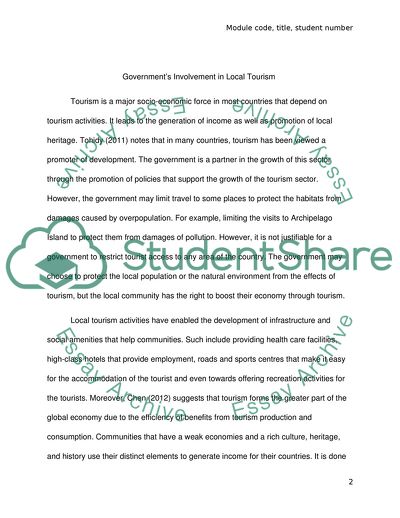Cite this document
(Governments Involvement in Local Tourism Essay Example | Topics and Well Written Essays - 1750 words - 2, n.d.)
Governments Involvement in Local Tourism Essay Example | Topics and Well Written Essays - 1750 words - 2. Retrieved from https://studentshare.org/tourism/1869990-it-is-not-justifiable-for-a-government-to-restrict-tourist-access-to-any-area-of-their-country-the-government-may-wish-to-protect-the-local-population-or-the-natural-environment-from-the-effects-of-tourism-but-the-local-population-has-the-right-to-boos
Governments Involvement in Local Tourism Essay Example | Topics and Well Written Essays - 1750 words - 2. Retrieved from https://studentshare.org/tourism/1869990-it-is-not-justifiable-for-a-government-to-restrict-tourist-access-to-any-area-of-their-country-the-government-may-wish-to-protect-the-local-population-or-the-natural-environment-from-the-effects-of-tourism-but-the-local-population-has-the-right-to-boos
(Governments Involvement in Local Tourism Essay Example | Topics and Well Written Essays - 1750 Words - 2)
Governments Involvement in Local Tourism Essay Example | Topics and Well Written Essays - 1750 Words - 2. https://studentshare.org/tourism/1869990-it-is-not-justifiable-for-a-government-to-restrict-tourist-access-to-any-area-of-their-country-the-government-may-wish-to-protect-the-local-population-or-the-natural-environment-from-the-effects-of-tourism-but-the-local-population-has-the-right-to-boos.
Governments Involvement in Local Tourism Essay Example | Topics and Well Written Essays - 1750 Words - 2. https://studentshare.org/tourism/1869990-it-is-not-justifiable-for-a-government-to-restrict-tourist-access-to-any-area-of-their-country-the-government-may-wish-to-protect-the-local-population-or-the-natural-environment-from-the-effects-of-tourism-but-the-local-population-has-the-right-to-boos.
“Governments Involvement in Local Tourism Essay Example | Topics and Well Written Essays - 1750 Words - 2”. https://studentshare.org/tourism/1869990-it-is-not-justifiable-for-a-government-to-restrict-tourist-access-to-any-area-of-their-country-the-government-may-wish-to-protect-the-local-population-or-the-natural-environment-from-the-effects-of-tourism-but-the-local-population-has-the-right-to-boos.


